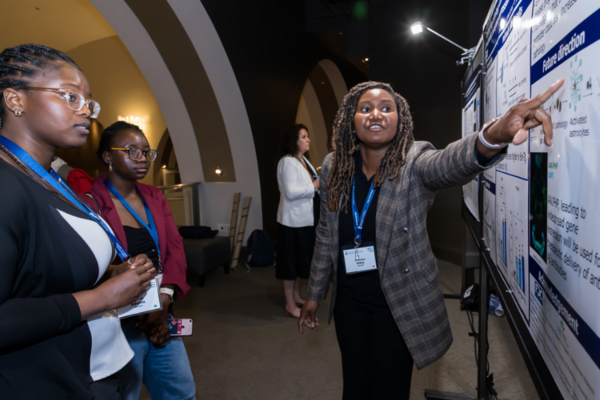Communicating research: how graduate students are building their skills
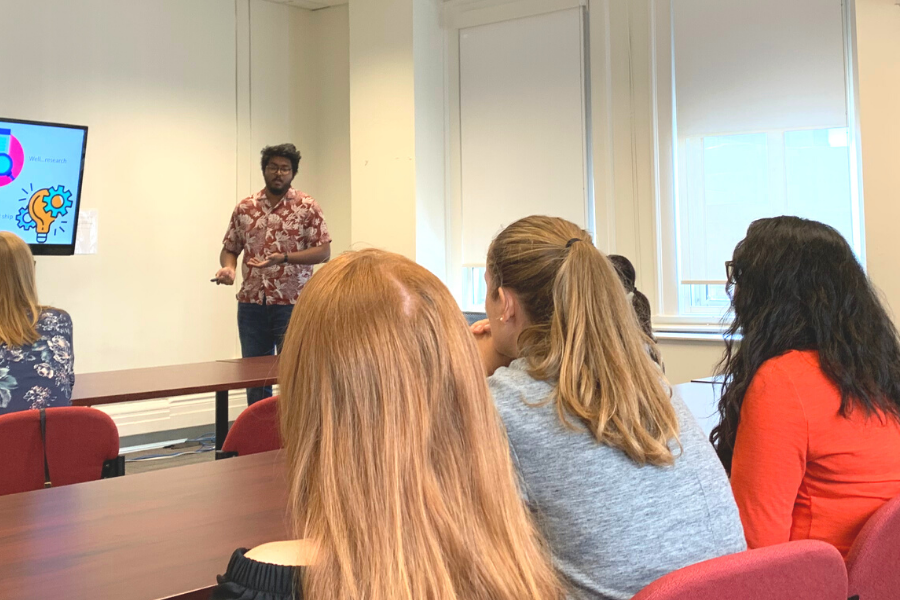
Being able to communicate your research succinctly and clearly to others is a vital skill for all students, whether that be for a thesis defense, a job interview or interacting with the public.
Members of the graduate student union, CLAMPS (Confederation of Laboratory Medicine and Pathobiology Students) identified a need for students to receive some extra practice when preparing for these important communications milestones.
Led by graduate student Sofia Melliou and her co-lead Matsya Thulasiram, the program now has a pool of around 25 coaches and has helped several students prepare for their presentations.
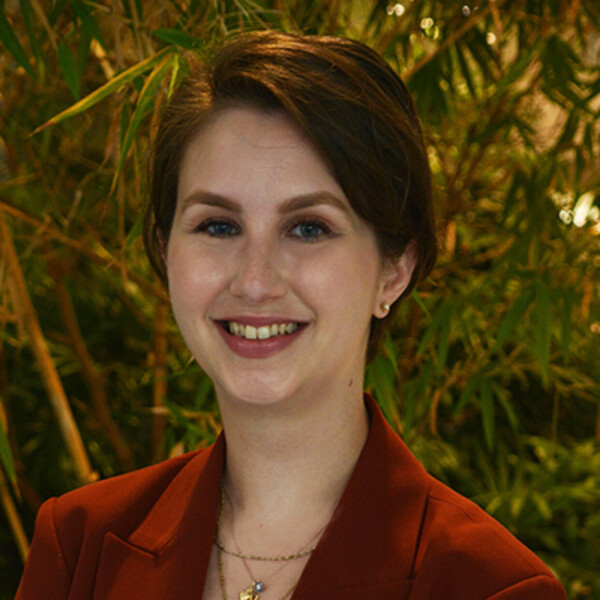
“I'm fortunate enough to be in a lab environment where I can present my research anytime in our meetings”, explains Sofia, “There are many students who don't have this opportunity so we wanted to make sure all graduate students could access some support.”
“When we started this initiative, we built it around the Monday seminars that research-stream students have to present at,” explains Matsya, “but we were very open to it being about more. Now students can practice a capstone or thesis defense, poster presentation or a three-minute pitch – basically anything they would like to get some feedback on. It gives them a second set of eyes from their peers, and those from a diverse set of backgrounds”.
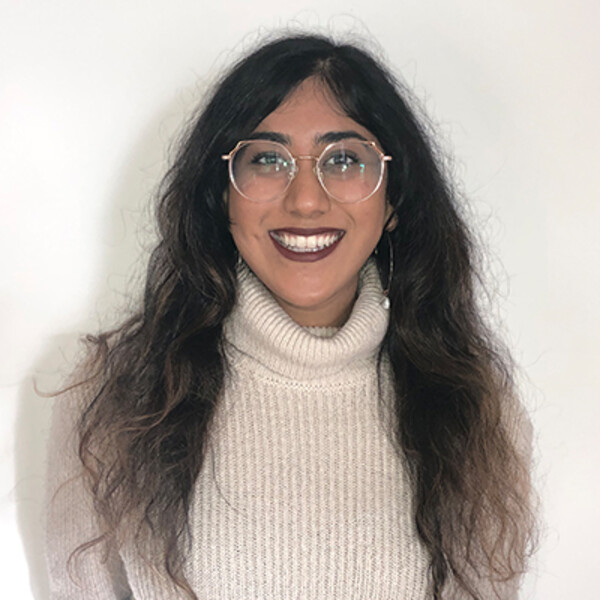
The pool of coaches consists mainly of senior PhD and MSc students, but also some recent graduates, and the team is hoping to attract some faculty. Students request a coaching session, then an email is sent to the coaching pool with a time and date and those who can help, volunteer.
“We have been amazed at how talented the students are at giving feedback. They are kind and constructive but to the point and provide great advice.” Comments Sofia, “We are very proud of how supportive the students in our department are of each other.”
“Some coaches who have taken part have then had a chance to see the final presentations and really noticed a difference so they’re very proud to have contributed to that,” continued Matsya.
Those involved in the program have also had an opportunity to hear more about the diverse research in LMP – something the team is looking forward to hearing more about at the upcoming LMP research conference (LMPRC).
“This is a perfect opportunity for peer-coaching,” says Sofia, “we’re really hoping that more students take advantage of this initiative to get ready for their poster presentations, so we are preparing for a busy few weeks!”

Joseph Hanna, PhD Candidate – coaching recipient
“I heard about LMP Peer Communication Team before my seminar presentation. Despite previously presenting in LMP, there is always room for improvement, and I thought it will be beneficial to get my peers' input. It turns out to be a profound and rewarding experience. The team was very accommodating by setting up a date to meet at a convenient time allowing me to prepare with enough time to adjust before the seminar.
The meeting was a wonderful experience where they gave me constructive feedback through discussions and in-depth feedback sheets. It was valuable to get the input of experienced peers from different research backgrounds. I got tips on how to get the audience more engaged and make my presentation clear.
After the seminar, I was able to see the difference from the audience's positive feedback. Overall, it was a profound experience and I highly recommend reaching out to the team to improve your presentation and public speaking skills. I am also looking forward to getting involved as a coach to pass on what I learned to my peers”.
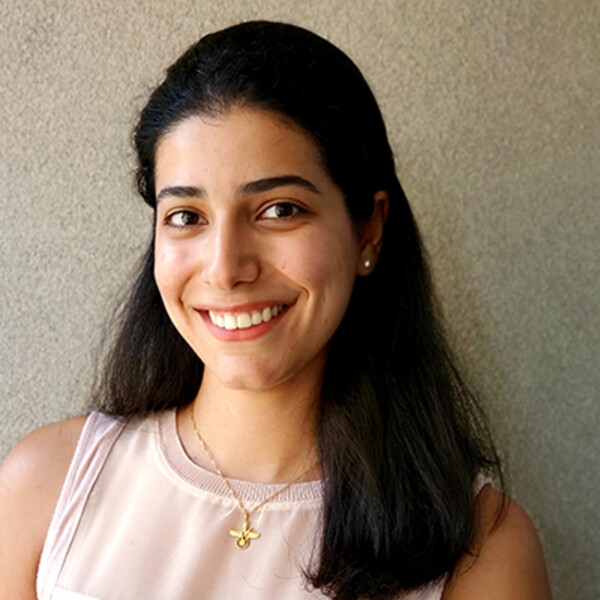
Negar Khosraviani, PhD Candidate – coaching recipient and now coach
“I joined the Peer Communications Team because I really liked the concept of graduate students helping one another on research presentation and effective communications. Through my involvement with PCT, I get the opportunity to transfer my presentation/communication skills to my peers while learning how to provide constructive feedback.
I would recommend others to join the Peer Communication Team as a coach because it is a rewarding experience to help a fellow graduate student, and the team is very friendly and supportive.”

Marsel Lino, alumnus of the MSc and PhD programs - coach
“I did my MSc and PhD at LMP in the laboratories of Dr. Khosrow Adeli and Dr. Michelle P. Bendeck, respectively. I am currently a Postdoctoral Fellow in Dr. C. Ronald Kahn’s laboratory at the Joslin Diabetes Center at Harvard Medical School, where I am studying the functions of non-coding RNAs in adipose biology and diabetes.
I was excited to learn of the LMP Peer Communication Team organized by Matsya and Sofia who have done an excellent job of providing a platform where students can practice their presentations and receive feedback from senior students or alumni. This is an excellent program that I wish had been around when I was a student!
One benefit of a multi-disciplinary department such as LMP is that I am always learning as a coach. LMP students are pretty talented, so I am often learning new and effective ways to communicate complex science and datasets.
I would strongly recommend becoming a coach! It is extremely well-organized, and Matsya and Sofia have done an excellent job moderating the sessions, so they are focused, effective, and on time. Importantly, it is a rewarding experience and an integral part of academic training and offers a rare opportunity to provide feedback while simultaneously learning about new fields of research.”



